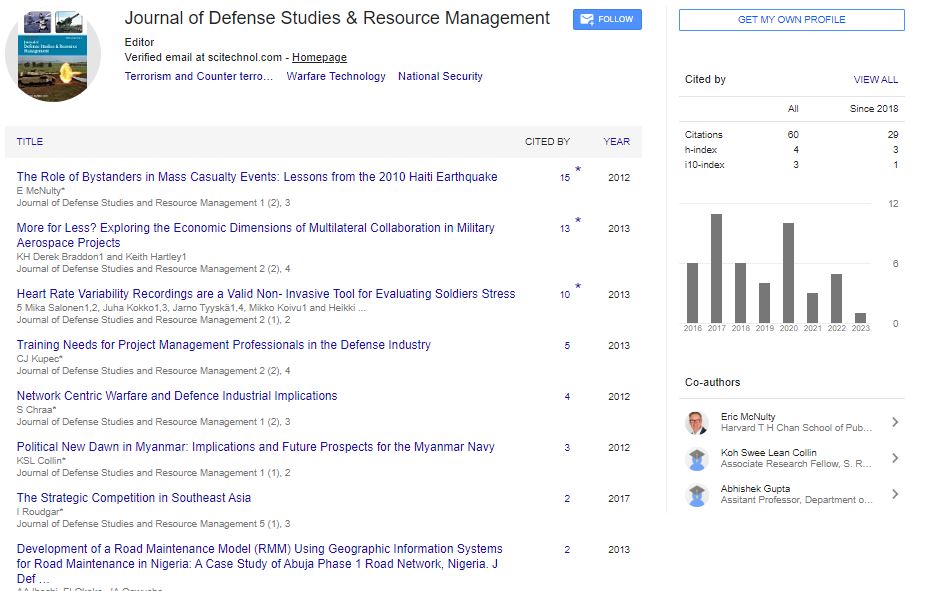Perspective, J Def Stud Resour Manage Vol: 11 Issue: 1
The Role of Public-Private Partnerships in National Defense
Andrew Walsh*
1Department of US Naval War, University of Baltimore, Baltimore, USA
*Corresponding Author: Andrew Walsh
Department of US Naval War, University
of Baltimore, Baltimore, USA
E-mail: andrew.walsh@nw.navy.edu
Received date: 28 February, 2023, Manuscript No. JDSRM-23-95541;
Editor assigned date: 03 March, 2023, Pre QC No. JDSRM-23-95541(PQ);
Reviewed date: 17 March, 2023, QC No. JDSRM-23-95541;
Revised date: 24 March, 2023, Manuscript No. JDSRM-23-95541(R);
Published date: 31 March, 2023, DOI: 10.4172/2324-9315.1000171
Citation: Walsh A (2023) The Role of Public-Private Partnerships in National Defense. J Def Stud Resour Manage 11:1.
Description
Public-Private Partnerships (PPPs) have become increasingly important in national defense, particularly in recent years as governments around the world have faced pressure to reduce their defense budgets while still maintaining military readiness. In this context, PPPs have emerged as a valuable tool for governments to leverage the expertise and resources of the private sector to support their defense efforts.
One of the key roles of PPPs in national defense is to provide governments with access to cutting-edge technology and innovation that may not be available through traditional government procurement channels. This is particularly important in fields such as cyber defense, where the private sector is often at the forefront of developing new technologies and techniques to protect against emerging threats. By partnering with private companies, governments can tap into this expertise and ensure that their defense capabilities remain up to date and effective.
Another important role of PPPs in national defense is to help governments address the complex and evolving nature of modern warfare. As the threat landscape has evolved in recent years, governments have increasingly recognized the need for more flexible and adaptable defense systems that can respond quickly to changing circumstances. PPPs can be instrumental in this regard, as they allow governments to work with private companies to develop more agile and responsive defense systems that can be rapidly deployed in response to emerging threats.
PPPs can also be an effective way for governments to improve the efficiency and cost-effectiveness of their defense efforts. By leveraging the expertise and resources of the private sector, governments can often achieve greater economies of scale and more efficient procurement processes, leading to cost savings that can be reinvested in other areas of national defense. This is particularly important for governments that are facing budget constraints or competing priorities for their defense spending.
Another key benefit of PPPs in national defense is that they can help to build stronger relationships between governments and the private sector. By working closely with private companies on defense initiatives, governments can foster closer collaboration and communication between the public and private sectors, leading to greater alignment of goals and more effective coordination of efforts. This can be particularly important in fields such as cybersecurity, where close cooperation between government and industry is essential to protecting important infrastructure and data.
Of course, there are also some potential drawbacks to PPPs in national defense that must be carefully managed. One of the main concerns is the risk that private companies may prioritize their own commercial interests over national security considerations, particularly if they are operating in a competitive market. This underscores the importance of strong oversight and accountability mechanisms to ensure that PPPs are aligned with national defense priorities and that private companies are held accountable for meeting agreed-upon performance standards.
Overall, however, the role of PPPs in national defense is likely to continue to grow in importance in the years ahead. As governments face increasing pressure to do more with less, PPPs offer a valuable tool for leveraging the resources and expertise of the private sector to support national defense priorities. By carefully managing the risks and opportunities associated with PPPs, governments can build stronger and more resilient defense systems that are better equipped to meet the challenges of the 21st century.
 Spanish
Spanish  Chinese
Chinese  Russian
Russian  German
German  French
French  Japanese
Japanese  Portuguese
Portuguese  Hindi
Hindi 